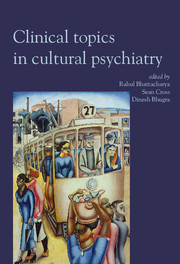Book contents
- Frontmatter
- Dedication
- Contents
- List of tables
- List of boxes
- List of figures
- List of contributors
- Preface
- Part 1 Theoretical and general issues
- 1 Globalisation, psychiatry and human rights: new challenges for the 21st century
- 2 Migration and mental illness
- 3 Mental health of refugees and asylum seekers
- 4 Racism, racial life events and mental ill health
- 5 Expressed emotion across cultures
- 6 Mental illness in Black and Asian ethnic minorities: care pathways and outcomes
- 7 Poverty, social inequality and mental health
- Part 2 Specific mental health conditions across cultures
- Part 3 Management issues in the cultural context
- Index
2 - Migration and mental illness
from Part 1 - Theoretical and general issues
Published online by Cambridge University Press: 02 January 2018
- Frontmatter
- Dedication
- Contents
- List of tables
- List of boxes
- List of figures
- List of contributors
- Preface
- Part 1 Theoretical and general issues
- 1 Globalisation, psychiatry and human rights: new challenges for the 21st century
- 2 Migration and mental illness
- 3 Mental health of refugees and asylum seekers
- 4 Racism, racial life events and mental ill health
- 5 Expressed emotion across cultures
- 6 Mental illness in Black and Asian ethnic minorities: care pathways and outcomes
- 7 Poverty, social inequality and mental health
- Part 2 Specific mental health conditions across cultures
- Part 3 Management issues in the cultural context
- Index
Summary
Summary Human beings have moved from place to place since time immemorial. The reasons for and the duration of these migrations put extraordinary stress on individuals and their families. Such stress may not give rise to comparable increases in all types of mental illness across all migrant groups. In this chapter, we provide an overview of some observations in the field of migration and mental health, hypothesise why some individuals and groups are more vulnerable to psychiatric conditions, and consider the impact of migration experiences on provision of services and care.
Migration is the process of social change whereby an individual moves from one cultural setting to another for the purposes of settling down either permanently or for a prolonged period. Such a shift can be for any number of reasons, commonly economic, political or educational betterment. The process is usually stressful and stress can lead to mental illness.
The preparation that migrants undertake, their acceptance by the new host community and the process of migration itself are some of the macrofactors in the origin of subsequent mental disorders. The micro-factors include personality traits, psychological robustness, cultural identity, and the social support and acceptance of others in their own ethnic group.
Migration to the UK has had many peaks. In the 20th century there were several: the first was the refugee influx during and around the Second World War; the second occurred in the 1960s, when able-bodied young men and women were recruited from the former colonies to fill jobs created by the belated expansion of the post-war economy. A decade later, following the political upheaval in East Africa, a large number of individuals migrated with their families, en masse.
Migrants can be classified using several different criteria, one of which is the legal definition. There needs to be a distinction between actual settlers and temporary migrant workers. The reasons for migration as defined by Rack (1982) include both ‘push’ and ‘pull’ factors. Settlers, as well as political exiles, asylum seekers and refugees, may well have to deal with very stringent legal procedures, which will test their psychological stamina.
- Type
- Chapter
- Information
- Clinical Topics in Cultural Psychiatry , pp. 15 - 26Publisher: Royal College of PsychiatristsPrint publication year: 2010



